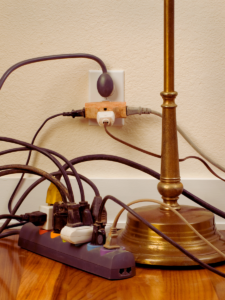 It’s one thing to feel a bit of warmth coming from your outlet. Maybe you’ve been charging your phone or running a small appliance for a while. But if that outlet is hot to the touch? We’ve got a problem.
It’s one thing to feel a bit of warmth coming from your outlet. Maybe you’ve been charging your phone or running a small appliance for a while. But if that outlet is hot to the touch? We’ve got a problem.
While it’s easy to dismiss this as a minor inconvenience, a hot outlet is an electrical hazard that could lead to something much worse like an electrical fire.
In this article, we’ll break down why your wall outlet might be heating up and what you can do about it. We’ll cover everything from common causes like overloaded circuits to faulty wiring, with some practical steps to take if you find yourself in this situation.
Key Takeaways
- Hot outlets are dangerous and should be dealt with immediately.
- Overloaded circuits, faulty wiring, and damaged plugs are common causes.
- Warm outlets aren’t always hazardous, but consistent heat should be investigated.
- If your outlet is hot with nothing plugged in, turn off the circuit breaker and call an electrician.
- Regular safety checks can help prevent electrical fires.
A Hot Outlet Is a Problem
Let’s get one thing clear: an electrical outlet should never be hot. There are no “safe” levels of overheating when it comes to electricity. Heat is your first warning sign that something isn’t right.
When electricity flows, it generates heat, but that heat needs to dissipate properly. When it doesn’t, the outlet gets hot. If you notice this happening, you should act fast.
This isn’t one of those issues where you wait and hope it goes away. A hot outlet could mean your electrical system is under serious strain, and that’s not something to mess with. Whether it’s faulty wiring or an overloaded circuit, the longer you ignore it, the more you risk an electrical fire. So, what’s the first thing you should do? Let’s figure out what might be going on.
What If the Outlet Is Just Warm?
First off, let’s not panic if your outlet feels warm. There’s a difference between warm and hot.
Some devices, like phone chargers and printers, have built-in transformers. They naturally create some heat when they convert energy. It’s not always a red flag.
Here’s a quick test to find out if your device is the problem: unplug it and wait about 30 minutes. After that, touch the outlet again. If it’s cooled down, the heat was probably coming from the device itself. Problem solved, right?
But if that outlet is still warm, or worse—getting hotter? That’s a different story. At that point, you’re going to want to unplug everything from the outlet and move on to the next step.
What If the Outlet Is Still Hot After Unplugging Devices?
Okay, so you’ve unplugged everything, and the outlet is still hot. That’s a bad sign. This could mean that you have an overloaded circuit, even if nothing plugs into that particular outlet.
Some homes have series-wired circuits, meaning the power is flowing through one outlet to reach others. If one outlet gets overloaded, the heat can spread along the circuit.
If this happens, your safest bet is to turn off the circuit breaker and call an electrician. Don’t just hope it cools down. This is a serious issue, and ignoring it could lead to a fire.
What If Outlet Feels Warm With Nothing Plugged In?
If your outlet is warm when nothing’s plugged in, you might be dealing with one of these issues:
- Circuit overload: Too much power flowing through the circuit, even without devices plugged into that particular outlet.
- Damaged or improper wiring: Loose or corroded wires behind the outlet.
- Dimmer switches generating heat: Dimmer switches can cause heat buildup, especially if they’re controlling multiple light fixtures.
What If Plug on My Charger or Appliance Gets Hot?
We’ve talked about outlets, but what if the plug itself is getting hot? That’s another issue you don’t want to ignore. Energy dissipation from chargers and appliances can make plugs warm. However, if the plug feels hot, it may mean the device is using too much power for that outlet.
You can troubleshoot by plugging the device into a different outlet. If the plug is still hot, the problem is probably with the device, not the outlet. If the plug stays cool, then you’ve got an issue with the outlet or the circuit itself.
Common Causes of Hot Outlets
 There are a few typical reasons why your outlet might feel like it’s overheating. Let’s go through the most common ones.
There are a few typical reasons why your outlet might feel like it’s overheating. Let’s go through the most common ones.
Overloaded Circuit
If you’re like most people, you probably have more devices than you have outlets. And that’s where the trouble starts. When you plug too many things into one circuit, it can get overloaded, causing the outlet to overheat.
Ever had a breaker trip? That’s your home’s electrical system saying, “Hey, I can’t handle all this!”
When a circuit is overloaded, the wires heat up, which could cause the outlet to get hot. Signs of an overloaded circuit include frequently tripping breakers or a GFCI outlet that keeps resetting. If that sounds familiar, start by unplugging a few devices and spreading them across different outlets.
Faulty Wiring
Loose or corroded wiring is another big red flag. This can cause excess heat and, in some cases, even sparks. It’s like having a bad connection in your phone charger—only much more dangerous. If the wiring behind your outlet isn’t making a secure connection, it’ll generate heat, and that heat will radiate through the outlet.
Signs of faulty wiring can include flickering lights or bulbs that burn out faster than they should. If you suspect faulty wiring, don’t wait for things to get worse. Call an electrician and ask them to inspect your outlet. You may even need to upgrade your home’s electrical wiring, especially if you live in an older house.
Appliance Chargers and Wiring
Believe it or not, even your trusty phone charger could be part of the problem. Devices with transformers, like your laptop or phone charger, convert energy, which can generate heat. But if your outlet is consistently hot, especially when charging small devices, something’s not right.
Larger appliances like air conditioners or refrigerators can cause more trouble. These often require a dedicated circuit.
If you’ve plugged a big appliance into a regular 15A outlet, you might need to upgrade to a 20A outlet. And if you’re not sure what kind of circuit you need, call an electrician. Better to be safe than sorry.
Overloading Power Strips and Extension Cords
We’ve all been guilty of this one—plugging five things into a power strip or extension cord and thinking everything will be fine. Spoiler: it’s not fine. Overloading power strips or extension cords can cause the outlet to overheat and even start a fire. The more devices plugged into the same outlet, the more strain you’re putting on that circuit.
If you need to use a power strip, go for one that has surge protection. And make sure you’re not cramming too many high-wattage devices into the same strip. Better yet, distribute your devices across multiple outlets to avoid overloading any one circuit.
Damaged Plugs
Before you assume your outlet is the problem, check the condition of the plugs and cords you’re using. A damaged plug can cause an outlet to overheat or malfunction. Frayed wires or cracked insulation are common culprits.
Take a close look at the cords and plugs connected to your outlet. If anything looks damaged or feels unusually warm, that’s likely where your problem is. Replace the cord or plug and see if the outlet cools down after.
What to Do About a Hot Outlet: Immediate Steps to Take
So, what should you do if your outlet is hot? Here’s the plan:
- Turn off the circuit breaker: Immediately shut off the breaker that controls the outlet. This stops the flow of electricity and prevents further damage.
- Contact a licensed electrician: Have an electrician inspect the outlet and the wiring behind it. They’ll check for any loose connections or faulty wiring.
- Consider an upgrade: If your home has outdated wiring or your circuits can’t handle modern energy loads, it might be time for an upgrade.
Keep Your Home & Family Safe With Right Touch Electrical
 Quality with a master’s touch—Right Touch Electrical is here to keep your home’s outlets safe. They offer expert electrical services for homeowners in Houston, TX, and the surrounding areas. Routine safety checks and inspections can help prevent electrical fires. Don’t wait until there’s an issue get your electrical system checked regularly.
Quality with a master’s touch—Right Touch Electrical is here to keep your home’s outlets safe. They offer expert electrical services for homeowners in Houston, TX, and the surrounding areas. Routine safety checks and inspections can help prevent electrical fires. Don’t wait until there’s an issue get your electrical system checked regularly.
FAQs
Why is my wall outlet hot?
A hot wall outlet usually means there’s an overload or a wiring issue that needs to be fixed immediately to prevent fire hazards.
Can a hot outlet cause a fire?
Yes. If your outlet is overheating, it can spark and cause an electrical fire.
What should I do if my outlet is hot but nothing is plugged in?
Turn off the circuit breaker and call an electrician to inspect the wiring.
Is it normal for a phone charger to make an outlet warm?
A little warmth is okay, but if the outlet is hot, you’re likely overloading the circuit or have a faulty charger.
Final Thoughts
Don’t take a hot outlet lightly—it’s a serious issue that requires immediate action such a bad circuit breaker. If your outlet is hot, turn off the power and call a licensed electrician. They’ll inspect the wiring, fix any issues, and help you avoid potential hazards. Stay safe and keep your home’s electrical system running smoothly.